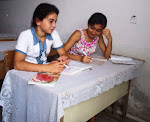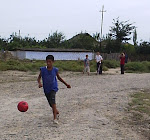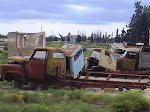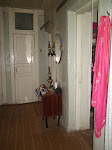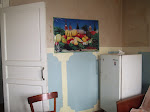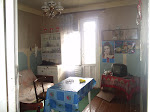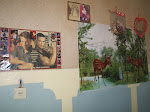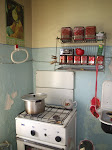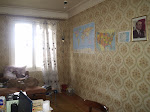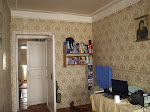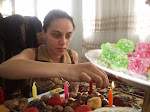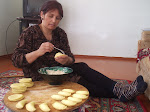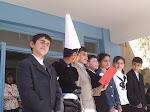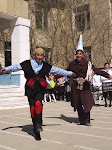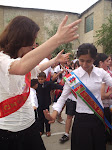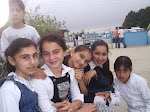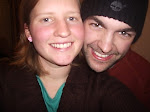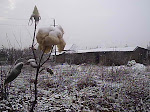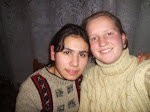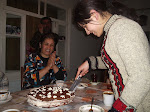Wednesday, July 15, 2009
This is where my head is, in my sleep, but also, usually, no matter where I am:
I thought it was Chicago. I took a left and walked for two blocks, what seemed like several hours, when I came to sign that read, “San Francisco Eatery,” and I was confused. The botanical courtyard stood in the middle of a two-lane round-about. When I sat down in the middle of it to rest, because my eyes were hazy and thoughts were grey too, my head dropped to two cold, bare feet on the dirty pavement.
When I saw these nice black, floral, ankle-high pumps under a bench I slipped them on. Soon enough a woman yelled, “Excuse me! Those are my shoes!”
“Oh, I’m sorry, I thought they were mine,” because I thought they really were.
“How can you steal people’s things?”
“I didn’t know. I didn’t mean to. I’m just very confused and don’t know where I am.”
“Did you just get back from Peace Corps?”
“Yes, I did!”
“I understand, I was a Peace Corps Volunteer too! I didn’t know where I was for a long time when I got back, things will get better, I promise!”
7/10
“Sasha, meet me at school. You need to help with computers.” This is how they speak here, in commands. Obediently, I go.
The girl who calls, Pervan, is not at school. I walk home. Turn on the fan, lay on my bed. The fan shuts off with the 8 o’clock electricity shortage. She calls again. “Sasha, where are you? I told you to meet me at school to help with computers.”
I go again. She is not there. I walk home. Lay on my bed in the corner of my swelteringly hot room.
“Sasha, where did you go? Why aren’t you here? You need to help with computers.”
“Are you going to be there when I get there?”
“Yes, of course.” This is the speed of development.
She is there, with a young girl, a smile like the swooping shape of a long bridge.
“Good morning, Sasha, how are you?”
“Fine, thanks. Where are we going?”
“There’s a new computer center in the middle of the village.”
“Really?”
It’s a small thing, an old white shack with blue trim, where diagrams for a mechanics course are hung in the halls. Dusty, crumpled, written in Cyrillic, they haven’t been touched in years.
There are three rooms here, and each house one or two computers where students type with one right index finger. The speed is like watching a beginner musician grapple with the
“What is this?”
Turial smiles. I met Turial at a wedding a couple weeks before when he modestly shook my hand and offered a curtsey. He is tall, and thin, and smiles ardently when speaking of possibility.
“They’re from the town center, from Baku, actually. The government wants to teach teachers to use computers.”
Indeed they do, but it’s a wonder they’ve provided my little village with HP Laptops to start.
“Other villages and the town center have them, too.”
“Well this is great. Are you teaching programs?”
“Yes. Here are the teachers.” He hands me a list of a couple familiar names and some he says are 30 minutes into the town center.
“Are the courses free?”
“No, this is not your class, Sasha! They are 90 manats.”
“Oh, that’s a lot.”
“No, for three months. One month is 30 manats.”
“When do they come?”
“Once a week.” Expensive.
“Can I teach?”
“Yes, we want you to help with English. We know Russian, but we need to know words in English.”
Through a Turkish translator online I found a Turkish to English 1200-page dictionary of computer terms.
Two days later I brought it on a flash with an Azerbaijani Foreign Leadership Exchange (FLEX) Program guide for study abroad students.
“Oh, this is very good, Sasha. Thanks. Can you teach an English conversation club here?”
“Sure. When do you want me to come?”
“3 o’clock, Monday, Tuesday and Wednesday.” It is noon on Wednesday, so at 3 o’clock I slap on sun block and hike back to the computer center under the tress, adjacent to the open field where rusted, tireless trucks lay vacant in the distance. No one is there.
Pervan calls me at 4 o’clock and I’ve already slipped into short shorts and flipped the fan to the highest level. “Maybe next week,” I tell her.
7/14 ONE MONTH TILL FLIGHT TO SFO
7/15
Lankaran is two hours north of Iran, and is a city known for its forest and waterfalls just out of the town center. I traveled to Lankaran this past weekend to give a presentation entitled “The Ins and Outs of Interactive Visual Aids” to the Azerbaijan English Teacher’s Association (AzETA).
On Sunday morning five teachers and three PCVs watched the PowerPoint presentation on how to use local products to construct aids you can touch, stick, turn and sometimes flip. I brought a human body that we constructed using a big, white sheet of paper, markers, cardboard, plastic wrap, hard wood and Velcro. Using few artistic skills, we crafted a human body and stuck Velcro to it. Using construction paper we cut out clothes for the body and glued each article of clothing to a piece of cardboard and then Velcro. The clothes rip on and off the body for winter, summer, fall, and spring apparel.
Other aids were drawings of verbs on flashcards that match up words from a list, clocks cut from construction paper and fastened with brads, and a mixed fairy tale where you arrange the pictures and sentences accordingly.
Teachers and Volunteers were elated. Through short exercises with the visual aids both recognized the value of physically interacting with the subject, and that the project at hand is cheap and very attainable.
So much of what we do as students in the U.S. is interactive: Speeches, science projects, art class. I think that we need more of it in our classrooms, more entrepreneurial and service-learning projects, to connect the world to students and visa versa.
That said, so much of what they do here is staunch memorization with no critical assessment or interaction with the subject being learned.
Providing students with interactive visual aids is so far from where we are in the U.S., but so close to where Azerbaijani educators and students need to be.
To introduce not just a method of teaching but a method of thinking and being is profound; that’s what this is: instead of simply thinking about the subject, interact with it, play with it, and question it. And when they recognize, “Yes, we can do this too,” oh, the profundity of it is overwhelmingly cheerful.
I’m really going to miss what I do here. It is by far the most rewarding work I’ve ever had, and I will be fortunate if I can come close to this feeling and stimulation in the way of a career.
Sunday, June 14, 2009
Arzu, or “Wish” is the new wedding palace just outside my village. Like most wedding palaces in Azerbaijan, it is a rusty red concrete block on the side the freeway. Inside hang few flashy ornaments, such aa disco ball which marks the center of the room. On stage, the bride and groom are behind a long fringed cream-colored table, the two barely visible behind baskets of fruit, plastic rose bouquets, and boxed and bottled Russian beverages.
The newlyweds’ faces are blank, which could be interpreted as boredom, sadness, or seriousness—the latter, having not yet caught on to the speed of point and shoot cameras, the affection exhibited in most Azeri photographs. In the case of this bride, Farida Ibrahamova, I would guess it’s as sense of neutrality to the whole experience.
Guests’ tables are draped with fine white linen. Early season tomatoes and cucumbers are first to arrive. Stalichni salad of tiny potatoes, carrots, jarred peas, eggs, chunks of soft beef, mayonnaise, and salt and pepper are served, accompanied by grape leaf dolma topped with homemade bitter yogurt, and salty, fried local stuffed sturgeon. Plov, the national meal served with chigertma, a greasy dish of chicken, eggs, sautéed tomato and ghee, is the main course. Fanta, Coca-cola and fizzy water are the drink of choice on the women’s side, while vodka and red wine is a staple of the men’s.
Azerbaijani weddings are like a seven hour reception, so as the parade of food begins so do the speeches. One by one male family members drunkenly congratulate the bride and groom in repetitious lines as we do in America: “I hope your life together will happy, successful and healthy, with lots of babies!” Then the variation to modern American wishes: “And may the bride be obedient and take care of you and your children well, and cook and clean, so you can provide for your family! Best of luck!”
After each speech is lauded, the man’s immediate and extended family members dance to traditional music from the live, hired mugam band. There are no discotecks or night clubs in the regions of Azerbaijan, so Azeris pour six months of pent up moves and angst onto the dance floor.
It is now that face of the 23 years of solitude smiles, twirling with friends her husband has for months forbidden her to visit.
I dance after the director of our school exhibits his wistful but authoritarian smile to the audience. My loose wrists are tossed into the air and I shake and shake them in a pattern that compliments the accordion, tar and throatal singing of the short, stocky man on stage. I still don’t know what to do with my feet and I tell this to Nushaba but she responds, “No, Sasha, you dance like an Azeri now. It is very nice.” Apparently they also don’t know what to do with their feet.
I maneuver those awkward steps across the dance floor to photograph two young girls bounce around a 20-something male, an act acceptable exclusively at weddings. I snap a couple neighbors and they immediately ask for prints. “When I go to Baku,” I promise.
“I love him, Sasha, but he is a strict man,” she would tell me the year of her engagement.
“Farida, if Jeyhun does not let you come to my house for two hours to watch a film, this is not strict, this is crazy.”
I am seated with neighbors who are excited to see me dance, laugh and speak casually with locals on a non-work related basis.
“Sasha, you know the U.S. economy is very bad. And there’s bird flu. You can’t go back there. You have to stay, Sasha. You have to stay.”
“That is very kind, but I miss my friends and family very much.”
“But the food is very good here!”
“Yes, that’s true.”
“Do you like the wedding, Sasha?”
“Yes, you know, every wedding I go to I like better. I understand everything better, the food is my own now, I know every one and I can speak with them. It’s nice, thanks.”
Jeyhun is Farida’s cousin. “Disgusting,” we think. In reality, to ensure a positive relationship, free from unsolicited fornication and physical abuse, you marry someone you already know. Someone who knows your family and customs, parental expectations; someone you know will—above all else—keep you safe. That someone is most immediately your cousin.
Farida is wearing a strikingly blue dress to match her husband’s blue collared shirt and blue tie. She stares into the audience positioned upright, hands folded in her lap. She eats cautiously as all are watching on the three monitors hung on different sides of the room. The formality overshadows her shear eloquence.
“You can’t sleep all the time, Farida,” I would tell her weeks preceding the ceremony.
“I know, but I have nothing to do. Just sit. Then watch T.V. Help my mother.”
“Maybe you could read or something. It’s unhealthy, Farida.”
“I think it will be better, Sasha. When Jeyhun get out of army we move to Turkey. There he can paint.” And what will you do, Farida?
Farida would never break off the wedding. Too much shame and honor missed. Neighbors and family would judge. Family may not “take her back.”
But many women in America hang on because it’s shameful to do otherwise, too. Many women return to their husbands out of fear of dishonor and displacement from their community. Many women stay because they don’t know what to do or where to go otherwise.
Azerbaijanis do not have a positive view of the Western tradition of love and marriage. In America, divorce filings are common as weddings. From what Azerbaijanis see on film, affairs occupy a comfortable place in a “successful” marriage. From my experience, this state of affair is not far from the truth.
In Azerbaijan, they are trying to hold onto what I see as a broken system; but wouldn’t you say we’re doing the same? Limited access to marriage, affairs, contracts and annulments, secrets, broken homes, scarred children.
I would take our broken system over theirs any lifetime, but the more I understand this culture the more similarities I see with ours. Maybe we don’t have arranged marriages, but we have arranged social norms just like every other country in the world.
I asked yesterday as she was displaying the furniture fit for their new home what she will do if Jeyhun doesn’t let her work.
“I want to work, Sasha. But Jeyhun says ‘no.’ If he doesn’t, then I don’t know. We must see how it will be.”
6/14
Our supermarket is about half the size of a 7/11, though it shelves about three times its contents. It is located at the swooping turn on the main road, a faultless location for village residents. The store owner, Mahanmet, is also the P.E. teacher at school, and fittingly so, a real big guy.
“Sasha! How are you?” he laughs. After having facilitated football and volleyball lessons during the week, Mahanmet appears only on the weekends. He helps shelve cans and carries deliveries to the back, but mostly he watches his son and his son’s childhood friend run supplies and tally customer orders.
“Would you like tea?” He asks, seated on the lone aisle between boxes of almonds and imitation Snickers.
“Yes I would, thank you!”
Mahanmet Teacher heaves himself out of his chair and orders me to have a seat and relax.
“I will get the food for you as you drink your tea,” says the assistant shop keeper Mahir, as he hands me three pieces of nut-filled chocolates. “You can eat whatever you’d like here” he reminds me. He points to the plastic covered boxes filled with paklava and sugar cookies, which Azerbaijanis buy by the kilo. It reminds of the barrels of fig newtons at Pack ’n’ Save, which as a kid I lauded as a great supermarket innovation.
A couple months ago Mahanmet Teacher asked me why I left every weekend to the town north. “Do you want to get out of the village?”
“Well, yes, and I help the volunteer there, Jenni, do a swimming club. But I also go there to buy things I can’t get here.”
“What?! What can’t you get here?”
“Milk, lavash, different kinds of bread besides Baku bread, yellow cheese, toilet paper—” He stops me there, wide-eyed, like I said “Paper to wipe my poopy ass with.”
“I don’t eat cheese, Sasha, it’s not healthy.” Just what a P.E. coach in his condition would say.
Still, as Azerbaijanis would, two days later I returned to Mahanmet’s to discover brie and camberet. Today we have sliced white cheese and gouda. He remains stocked with toilet paper, milk and “black bread” which is the shape and texture of whole grain, and which I now slice nearly every morning to enjoy with over easy eggs.
“Sasha, what do you want?” asks Mahir.
“A half a kilo of tomatoes. Two peppers. Two garlics.”
“And then?”
“Three-cow cheese—“
“Sasha, your Azerbaijani is clean. You have learned our language, but you will forget it when you leave.”
“Yes, I know. When I come back to Azerbaijan in five years I will not know your language any more.”
Struck by the suggestion that I’d come back, he responded, “Thank you, Sasha. It’s ok you will forget, that will happen.”
Mahir finishes my order as I hit the loose leaves at the bottom of the pear glass.
“Do you want more tea, Sasha? Anything else we can get you?”
This is what they do here, not just for me, but for other guests, too.
“Oh no, thank you, I’m done. That’s it. How much is it?”“Two manats, 60 gepik.”
As negative as I am here, these people care for me. They care for me in a way my American neighbors and shop owners never have or will. Our “get-it-yourself” attitude is one I miss, yet one I may have trouble adjusting to when I get back.
“Ok, thanks. See you later!”
“Sasha, thank you! Come drink tea when you’d like!”
Wednesday, June 3, 2009
Summer Softball
https://www.peacecorps.gov/index.cfm?shell=resources.donors.contribute.projDetail&projdesc=314-052
Donate a buck or few, any amount'll do!
Tuesday, May 5, 2009
Playlist #7: thesearetherunningsongs
“Sasha, what are you doing?” Common question here, warranted or not.
“I’m running.”
“Why?”
“It’s good for your health. And since I’ve been in Azerbaijan I’ve gotten bigger.” I roll my hands over my stomach.
“Aren’t you cold?” I am wearing a neon green Azerbaijan t-shirt and black sweats to cover the unmentionable parts of my body i.e., my knees.
“A little. But I will run and then I will be hot.”
“You will get sick.”
“No, I will be fine.”
“Sasha, please put a jacket on.”
“No, I’m running, I’ll be fine.”
I throw a wave and take off, iPod sharing Wilco’s “Misunderstood,” apartment’s skeleton key in pocket, positive thoughts for “five months, five pounds,” and not a clue as to where the dirt path may lead.
I’ve been here for over 20 months, but the farthest I walk is to my counterpart’s, 15 minutes from my apartment, 10 if I take the side roads.
Two things come of this: 20 pounds, and me not knowing my 2 by 0.5 mile village.
My first day running puts me behind School #1, straight into a group of disrespect. Soccer boys, high on maleness, in unison, stop to stare. I begin to run toward a fence since I can’t see into the deep sun, but one of the boys from my seventh grade class uncharacteristically warns me otherwise: “Go over the ditch, Sasha Teacher!”
I U-turn, and placing one slow foot in front of the other, balance a slippery mud pipe under my feet. Below is trash, feces, and chickens eating the trash and feces, and if I fall I remind myself I have no place for a decent shower so I construct I detailed scuttle across the big metal cylinder, which means fast, real fast.
Then I run: for 20 minutes, on soft, uneven dirt road.
I see the woodshop teacher driving with his car of young sons, three of which I didn’t know he had, and when we make eye contact he laughs. At me. So I wave back and laugh too, which has been a pivotal lesson in my Peace Corps service: If you can’t beat ‘em, join ‘em.
I run far and jump piles upon piles of fresh manure.
Khanims, old and young, see me coming and drop their big potato bags full of bread and ask me what the hell I’m doing. “Exercising,” I say, and I keep running with concentration, determination and The Clash screaming, “Everybody wants a ride on the rockin’ roller coaster.”
I’m in the clear till I hit the levy on the crazy Kur, where rabid dogs are sure to congregate. I run into three, four, and each time we back off one another, in hopes that he won’t bite and I won’t throw heavy rocks.
I run off the levy, back to the three-house street I pleasantly consider my neighborhood.
The shop owner Abdullah turns, they all turn, like it’s the first time they’ve seen this here American. In reality it’s just the first time they’ve seen this American this fast, this determined, this sweaty, and being this American.
This was two weeks ago and since, I feel like I’ve made real progress in my quaint but conservative Azerbaijani settlement.
“Are you exercising today too?” asked Nativan Teacher. “That’s good, Sasha. If I could, I would run with you.”
Allow me to translate: If people wouldn’t judge me, I’d run. If they wouldn’t say I’m trying to catch the attention of men, I’d run. If all the traditions, and all the silly social norms and gender roles didn’t dictate my everyday and what I want for my children and the whole of my country, I would run.
5/5/09
Just finished Empire Falls by Richard Russo. Highly recommended.
Playlist #8: hisfaceistopographicallychallenged
On my first day of school in my small village town, a terribly short, crater-faced man most literally ran up to me to announce: “Hello, I am Shahin Teacher. I have a music tape.”
“Oh, that’s great. It’s in English?”
“Yes, in English. It is Jane Child. She have very nice voice.”
“Oh, good.”
“But only one problem.”
“What’s that?”
“I don’t know what she says.” I look away, like I don’t know what’s coming. “Can you transcribe tape for me?”
“Sure, Shahin Teacher. But I just got here, so when I have time.”
“You can?! Oh, that is great. Thank you. I wait long time to meet American.” To transcribe a Jane Child tape. Glad my skills are coming in handy my first week as a Volunteer.
 Modern Talking
Modern TalkingIt’s for this reason Shahin, as a geography teacher, has superior listening and speaking skills to most English teachers’ here. Shahin says things like, “No problem” instead of “It is not a problem,” and “I’m good” instead of “I am very well, thank you.”
The other day were talking about Obama’s blackness (Which is usually like, “Obama is black,” and I say, “Yes, he is.”) when I asked, “What are some other singers or groups you like, Shahin? Did you say you like Talking Heads?”
“Would you like a mix of songs, Shahin? On a CD?”
“Oh no, I have no CD. Only tape.”
“Are you going to buy a computer like other teachers here?”
“Oh no, I don’t need. But maybe I can take CD to other friend’s house and listen. If I like, I keep, if I don’t like I—“ He flipped his hand to the side like he was throwing crumpled paper to the waste basket.
“Ok, Shahin.”
“Can you bring tomorrow?”
“Sure.”
“But can I ask you question?”
“Sure, Shahin.”
“Why you take that photo of monument in Europe?”
“What?”
“That photo of child.” He’s referring to the delicate, if half-heartedly amusing naked baby peeing into a concrete bowl in Prague. It’s quite
“Oh, you know, it’s nice. I take pictures of buildings, nice architecture, statues.”
“Oh, I was just thinking, just wondering because—do all American girls like this?” Penises?
“Sure, art. We like art, Shahin.”
“Ok, thank you, just wondering, you know.”
Here is my soundtrack to Shahin Teacher:
Walk Like an Egyptian, the Bangles
Pony, Ginuwine
Dancing With Myself, Billy Idol
Crossroads, Bone Thugs N Harmony
Do You Really Wanna Hurt Me, Boy George and Culture Club
Gonna Make You Sweat, C&C Music Factory
1, 2, 3, 4 (Sumpin’ New), Coolio
Slap! Slap! Slap!, Da Brat/Jade/Missy Elliot
Down For Whatever, Ice Cube
Like I Love You, Justin Timberlake
Lost in Emotion, Lisa Lisa & Cult Jam
Gin and Juice, Snoop Dog
Love Rollercoaster, Ohio Players
Big Time, Peter Gabriel
Shoop, Salt-N-Pepa
You Can’t Hurry Love, Phil Collins
Champion, Kanye West
Playlist #9: ilikeforher
“Why is sheep not in circus?”
“I don’t know, Nushaba.”
“Have you ever seen sheep in circus? You see bear, horse, lion, zebra, bird, everything, no sheep.”
“True. I don’t think I’ve ever seen sheep at a circus. But I’ve only been to a circus once.”
“Why? Because they are dumb animals. Sheep. My husband wants to get sheep, but I think, why? I don’t know, I was just thinking about this maybe few days ago. No, I don’t want these, sheep.”
Friday, April 10, 2009
Snow
It began early morning winter, let up mid day, but settled in a night’s sky. Its chill has been felt in the thin air since. A week ago the season veered torrential. Little ones watched the world blowing this way and that from their window. Tired neighbors huddled by fires, and those without heat tucked under heavy woolen blankets. Big shops closed. Cars wouldn’t start.
I awoke to the turn. In my home, what came with the white wonders of winter was no gas, no electricity, no water, and a dying cell phone.
As the beep on my Siemans screamed its final seconds, I texted my go-to in times like this: “I’m coming.”
Yes, that’s a great idea! Go! You should get out while you still can! yelled my neighbors I slushed in the fresh white to the bus stop.
But in the big city three hours north of my town, the weather was far worse. The froth in the air was a call to far-north China Volunteers. My tiny toes were frost bitten with the bus ride, and outside snow had dried to ice, which stuck hard to the sidewalks.
“Where is the ice skating rink?” I asked Kelsey.
“We’re coming to it,” she replied, as we followed the dense, uneven ice across the train tracks.
Into the braze of the bazaar, Kelsey, whose enthusiasm for Iowa could win her some sort of award, began, “In Iowa, we call this black ice.” I nodded, assuring that only in Iowa they call it such. “You can slip and fall on this. See,” she pointed to the circular puddle with chunks of frozen molt, “black ice.”
Our limbs tripped to the ground as Kels reasoned, “Why don’t they put salt on this?” I hadn’t thought of this. They do that in the Sierras, up 50, I think.
Endlessly brainstorming best practices for development, we agreed salt shakers and the two of us would best accomplish this job.
Above our heads icicles held tight to ends of towels. After women use bare hands to wash linen, they hang the linen on lines connected to old, rusted polls which cause them to freeze and melt onto heads.
These are things I didn’t know about snow. I didn’t grow up in cold climate, so momentarily powder is Godsend; it is witnessing perfection in a chilled instant. It covers trash, feeds plants, and creates fresh water droplets for the little spotted birds that nest above my balcony. It selflessly delivers so much to the earth.
But Eric once told me that in Maine citizens wake to frozen car engines. Sometimes it gets so cold one has to rush to his destination in 30 seconds or less to avoid frost bite and losing a limb. What the fuck?
There is one grave difference between Maine and Azerbaijan: In America there is central heating, and here there is a small gas petch, like the ones cowboys in Western films to warm their hands by after a long ride in from town.
Most of this country, including the capital, is not set up for the condition it’s in. Pipes freeze because they are not wrapped or secured underground. When roads aren’t paved, days after snow, the melt-off freezes, while offside mud becomes fixed to the bottom of my boots.
Nearing the tarped green bazaar, I explained to Kelsey that this is what Sacramento would be like if it snowed. America would have to come a long way for that to happen, she assured me, as she pointed to the skating rink which is the road to the bazaar.
3/14
My Computer is Working at the Moment. That is a title and a statement.
It might be the electricity. Since Referendum Day and Novruz, the most celebrated holiday in Azerbaijan, are forthcoming, the power has been on most of the time.
Perhaps Allah heard my counterpart’s prayers. “I prayed that your computer would work so I can have your music.” Or maybe I have been plugging something in upside down, or have had the computer positioned at an odd angle, a display of my eternal inadequacy of operating Western technology. All likely stories, where water flows and oil shoots from the ground, yet operate with as much certainty as my mind.
Simple games like Scrabble, Hang Man and versions of Pictionary are surprisingly popular with these little folk.
The dialogue-centered conversation club switched to an English games club when I noticed students like Salam taking more water breaks than wanting to participate in Q and A round-robin exercises.
Scrabble is now part of my weekly routine. To simplify the game (No, I have nixed rules like you can’t attach words to the tail end of another, while I’ve added others such as you must know the translation of a word to play it.
In the end, the board looks more like Boggle than Scrabble:
I am not a game person. I’d rather cuddle with a book or watch a B-list film than run a monotonous board for hours on end. Unfortunately, for both her and me, the Volunteer closest in distance to my town is a board game fanatic. But playing with fifth graders whose English is limited to five-letter words and simple sentences has made me understand the value of games I once felt redundant. I should reconsider Settlers of Catan with Jenni on a southern night.
“Sasha Teacher, is, ‘zap’ a word?” What an excellent word!, one that can’t be dismissed because of silly teacher-rules. “Fourteen points, Salaam.”
3/16
Plans with a capital P
People are beginning to talk. About leaving. Peace Corps has posted the Close of Service date. This is where we travel to Baku for paperwork and lectures on ‘post-Peace Corps life." See, the problem is that this was such a goal since the day I heard of such a romantic, hard-core experience, that I haven’t really gotten around to thinking about what could happen next. I mean, I have, like I could get a master’s I suppose, or try to find a job at the hopeful end of our economic delirium (that’s what it is, right?). I guess those are plans. But they’re not Plans. A Plan. I should have some sort of Plan.
Most of the people I know don’t have a Plan, though I have always been this kind of girl, a girl with a Plan. Well into the tail end of my junior year of high school I didn’t know I could go to college at all, little lone receive good enough grades to carry me to where I am now (however much living in the middle of a banana republic no one has heard of is worth). But I always knew I would not be where I once was, and that was the Plan. Ok, so now that I’m out, where am I going?
I want to work. I want to be doing something, like I’m doing here, and which, school, even through a master’s program, doesn’t leave room for. There’s a lotta time in a college day, but not the kind that universities are willing to expend. Head in book. Research. Write paper. Repeat process. But then, I miss this. Why do I miss this? I want good talk, good reads and good discussion ya can't get in the work place, I s'pose.
Chicago Schools Service-learning Program looks inspiring. There’s the doing in education. But do I have to go to back to school to work in schools there? A credential with a master’s? More school. One sister wants me in Portland, temporarily a city too small for my ultra-, super-city radar. Add millions of people to the scene and get New York. From village, Azerbaijan to the Big Apple, perhaps a bit of a culture shock. New Orleans was suggested by a friend the other day. Or Philadelphia, where Peace Corps orientation was held—they had a pretty kickin’ night scene. Seattle. Too rainy. L.A.= shit. Detroit. Dirty and down-trodden, I hear. Dallas. Hot. Also hot: Sacramento. Hasn’t even occurred to me to go back there.
And ahhhh, San Francisco. So many friends have left San Francisco and the places I frequented, and really that’s from where my love of the place resonates. Also, it seems a stepping-stone city, the way a bachelor’s is a stepping stone to a master’s. I should go to a bigger city, with more people, and more potential! But why? So much energy, the kind that expires after five in the afternoon tailing to and from the places of doing. This is a very exhausting exercise. Maybe I want to chill in a village in America for a couple years. Do we have those?
Well, I suppose this reads more like a journal entry than a blog. Or does it? I should read blogs. Add that to my of Post-PC To-Do List.
Ok, so here’s the Plan, me, readers: I am going to come back in approximately five months and find a job. Or something. Maybe go back to school. Somewhere. Sounds about as reasonable as living in Azerbaijan.
4/1
Hasan Baba was a cool cat. He dressed himself in a pale blue brimmed golfer’s hat and dark flip shade glasses. Every day he sat on a rock to collect thoughts and say salaams to passerbys. Sometimes his buddies, who were quaint and cool like him, would gather around the rock to read verse from the Koran. They too would wave hi to passerbys and greet newcomers like me with great sincerity. More often than not, though, this is where you could find Baba, pressing his cane to the earth and puffing a cigarette whose smoke drifted to the Kur, just beyond the old bath house and gray, dilapidated levee. Forty meters west of this rock is where Hasan Baba grew up, and where, in his sleep, on March 31, Hasan Baba passed away.
Grandpa Hasan was the first local I met in my village. He was far more thrilled to meet me than I him. “Who is this?!” he laughed, clapping his hands and stomping his eternally white sneakers. He looked around to see if anyone else was seeing what he was seeing: a blond-haired, blue-eyed American girl fresh from California, something in all his years he had only recently viewed with clarity via E! on satellite television. “What is she doing here?!” he would laugh.
Gizbast Teacher, my counterpart and his loving daughter-in-law, has prepared the mourning ceremony. I’m not sure what it’s called here, though I suppose it would be the equivalent of a wake.
There are two rooms: the men’s is under a blue tarp outside, and the women’s in one of Hasan Baba’s bedrooms. “Go sit, Sasha. There they cry,” instructs Farida. She points to the women’s room where, poised on a traditional burgundy carpet, the female mullah sings hymns, praises Baba and begs God to receive his body well.
Women are pleased to see me and whisper smiles when I enter the room. They chant, urge me to join, and we lightly slap thighs in unison. This strikes a deep air of sadness and laughter, much like Hasan Baba himself.
“Hasan Baba can’t hear very well,” his son Abdullah would say. “You have to speak loud for him. Dad! Dad! Do you want more bosboscht?!”
“Would you quiet down?! I’m not deaf! And no, I don’t want more tea!”
Gizbast Teacher would explain to Baba why I have come to Azerbaijan and his village in particular, and either for his veiled disinterest or his hard of hearing, Baba’s small eyes would drift to the ceiling and slowly back to his bi-weekly Turkish serial. “Ok! Thank you for being here!” he would laugh.
Hundreds of people have come to mourn already. Some stay to help with cooking, others for only the prayer ceremony. Most everyone in the community, and family from distant cities, will come to weep for Baba.
After the long, deep prayer we eat a meal prepared by Gizbast, the daughter. The women ask about my being there, in the room, and in their village so far away from my own family where this very event could happen too. They ask me for more tea, which I now consider a gesture of treating me as their own, rather than a servant girl I once thought I was. I serve them and we speak for another hour before I excuse myself to a tutoring lesson at four.
I would like to think Hasan Baba and I shared a special bond. When Gizbast Teacher would complain that Baba spends too much time alone, I would defend him, reminding Gizbast that he is old and has spent many years with family and friends, and needs time to reflect. We would laugh at the way his family would yell in his ear, and turn up the T.V. full blast just for him. He would try to tell me about the Soviet Union, not because he wanted to reflect, but because I was an inquisitive youth, and he was a teacher.
Hasan Baba was 88 years old. In Azerbaijani terms, that’s like 130. People just don’t live that long. 55. 60. 65, that’s a good run. Eighty-eight years old. “He’s a hero to our people,” says my co-teacher Nushaba.
For all I know, Hasan Baba could have been a hero. He lived through the rise and fall an empire, and everything that came and went with it: jobs and job security, falling infrastructure, and dissenters’ imprisonments and deaths, many of whom were his friends.
For the spirit to safely reach God, it must be laid to rest as soon as possible. Within 12 hours, Hasan Baba is carried with 15 men to our village cemetery. They march the dirt path while women weep and wave handkerchiefs from Hasan Baba’s balcony. Now, along with the grieving indoors, loved ones can lay flowers on his grave.
Every Thursday for the next week friends will come to Hasan Baba’s to say a prayer. They will visit Baba’s family on Novruz, for Ramazan, and again, one year after his death day.
In Islam the mourning period is seven days, though because it’s not affordable for Gizbast’s family, this one will be only four. “We wanted Baba to see wedding. Mine and Jeyhun,” says Farida, who on Sunday had set her wedding celebration for April 25. She and her brother, both who will marry soon, must postpone their weddings for 40 days after Hasan’s death. This is the amount of days it takes a family to cry, says Farida.
Funerals in America are distant and brief, like too many of the relationships we hold. The
clapping, the chants, the crying and laughing, confined to a room in a moment of remembrance. On Hasan Baba’s death day, and on my birthday, I have been able to grieve.
Monday, December 22, 2008
“Sasha, I am sorry I am late for class, I was arguing with Hamana Muellim (Teacher) over grammar.” It’s how they release sexual tension, arguing grammar rules. “Read this: I work the most of all. Would you say this?” “Sure. What’s wrong with it?” She’s dying to tell me. “You do not use the here. It should be ‘I work most of all.’” “Why? I would say,” and I write, “Of all the students, she is the best singer.” “No, it is not the same! ‘Best’ is an adjective here.” “Yeah, it doesn’t matter—” “It does matter! But Hamana said that words there are some verbs that act as nouns, and are treated as nouns in this sentence.” “Well, yeah, but—” “I don't really understand what she is saying. I have not learned this. If it is true, I must tell all my students about this adverb.” “I don’t know, it’s what we say—” “You would say, ‘She sang worst of all the students.’” “No, I would say, ‘Of all the students, she sang the worst.’” She literally threw the pen on the desk. I will hear about this tomorrow, in a “See, I told you” kind of way.
“Sasha, come to my house to teach me computer,” so I did, and she was like, “I want to know about English grammar. Are there grammar games on here?” “No, I don’t have any grammar games, but you can get them from the internet.” “Ok.” “Ok. Do you have internet?” “No, but you do. You have computer.” “Yeah, but there’s no internet in the computer. Do you have a telephone line?” “No.” “Then you can’t have internet.” “But you have computer.”
“Sasha, light the petch. Don’t be scared.” “I’m scared, Yusif.” It’s a fucking torch. “I will light it, don’t turn it off.” “What if I have to leave?” “Keep it on.” “When I go to bed?” “Keep it on. Tomorrow, what time do you come home from school?” “Twelve o’clock.” “Keep it on…If you need to turn it off, turn it off here, here and here, or it will explode, Kapppewww!”
Wednesday, December 17, 2008
2. Kelsey on how to check if I turned off the stove: “Put your detector next to it, if it doesn’t beep then gas isn’t leaking, or your detector is broken.”
3. “Eat! Eat!”
“I’m full! I can’t!” I’d shouted back.
“Sasha, eat!”
The puke is coming, I know it. I can’t tear off fat from the goose meat, or sip more oil-salt based soup.
“Eat bread, Sasha!”
Now putting the spoon down. Host mother will be offended.
“I can’t, Sevda!”
“Sasha, eat!”
“I’m full!”
“Do you want tea?”
If I have tea I have to have cookies. But if I say no, she’ll be offended.
“No, I don’t want any.”
“No?! But you must! Drink tea!”
“I can’t!”
“Just one cup, Sasha.”
I felt like a toddler, crying when I wanted food, screaming when I didn’t. Explaining I have to wear leggings to school to cover my tattoo, defending why I have one in the first place. Insisting I can walk to school on my own, and travel to Baku on the bus, even with the language barrier. Trying to communicate I want to be alone, when in reality I never will be, not Azerbaijan.
In the first weeks with my training host family I couldn’t convey my displeasure for bosbocht again, or my discomfort with blaring midnight mugam music for the fifth night in a row. So I’d shut myself inside my room, inside my sleeping bag, with a headlamp and a book that would take me back to green, warm valley.
When we’re sad, this is what a lot of us Americans do: take a time out, and maybe cry alone, internalizing pain but reflecting on it to forge ahead.
When Azerbaijanis are sad, however, they huddle together and talk.
We open the window for fresh air and color, and they keep the drapes shut from their neighbors (or the KGB).
We believe in medicine, they in the rituals of the Persian Empire.
Americans eat the meat part, and Azerbaijanis the fat.
We write story, while they retell it.
Muddy flip-flops, spotless boots.
Blue jeans, black slacks.
One hour, one week.
Coffee, tea.
Cold, hot.
Ask, tell.
“Sasha, drink tea, and then we will eat. Here is an apple and persimmons and a banana. First eat this.”
At the dinner table last night Nativan filled the deep bowl with bosbocht, and passed it to my placemat with several pieces of Baku bread.
“Sasha, eat!”
I ate the loaded bowl, pulling out seeds from alcha, cherry pits used as a bitter sweetener in this soup.
“Sasha, give me your bowl. You must eat more.”
“No, Nativan, I’m full.” Three small children loitered, spooning imaginary soup into toothless mouths. “Eat, Sasha! Eat!” they mimicked their mother.
“Sasha, you are our guest, eat!”
“I know I’m you’re guest, Nativan, but I am full. I am finished.”
“Eat bread, Sasha!”
“Nativan, I will eat however much I want. I can’t eat any more. I am finished.”
“Why, Sasha? Eat!”
“Because I am full, Nativan. I will not eat more. In America this is not nice. You cannot tell me to eat more. I eat will what I want.”
“But Azerbaijanis like to feed their guests! You are a guest, Sasha, you must eat!”
Americans are taught that we can do and feel what we want, when we want, and express our opinions on any platform, indefinitely.
Azerbaijanis are not taught this. It is why they are astounded when I simply say, “No, I will not eat any more.”
Americans are raised to know what is best for the self, and to let others discover what is best for them.
Azerbaijanis are taught that the group matters. They are told guests should be given more than anyone at the table, even if the guest says she is full.
Host country nationals do not experience the awkward, scary, fragmented, liberating growth that PCVs do. Even if they did, they’d probably end on the same side they started, just as I have, but with more graceful ways to communicate it.
4. Cooked pad thai using ketchup yesterday. Don’t do that.
5. My counterpart’s daughter is more in tune with American culture than I ever have been. Like most Americans, Azerbaijanis live on credit, and here, they have satellite television to show for it. I had heard from PCVs that Brittany is back, and last night I saw her new pop video, which I swear is the same one that’s been airing for the past decade. “Madonna is helping her,” winked Altunay. The secrets of Hollywood, disclosed by a 14-year-old living in Azerbaijan.
Altunay was also the first to inform me news of the Iraqi journalist. She reported, “Man throw shoe at Bush.” After googling it, I realized there was no need to decode that one.
Monday, November 24, 2008
Sunday, November 16, 2008
Well this is just about the damned best hunk of sugar you’ll ever eat. From Charles City to Azerbaijan and right back at'cha. Courtesy of my friend, Kelsey.
“We’re not really what you would call foodies in Iowa.” -Kelsey, while eating marshmallow fluff straight from the jar.
6 eggs
2 c. white sugar
1/2 tbsp. syrup
1 c. margarine
1/2 c. chocolate chips
3 c. peanut butter
2 c. brown sugar
1/2 tbsp. vanilla
1 1/4 tbsp. soda
9 c. oatmeal
½ lb. M&M’s
Post from Oroville to Azerbaijan
“SASHA!!!NOOOOOOOOOOOOOOOOOOOO! I know your a san francisco libral...but come on. this guy is going to kill us . . . if this article is how you feel about our country than maybe you should stay out of it, sorry but im tired of usa haters, especially bill mayher.”
This is an excerpt, all the slander about Obama left out because that much was expected. What’s included is what was not expected, and what’s kept me in near-tears for two weeks.
This letter was in response to an Onion article I sent a friend after she lambasted Obama’s win with multiple MySpace bulletins. “the only good thing about this is that racism is now over! there is no more white guilt, black people are not special anymore, they are just a regular ass hole like the rest of us.”
The headline was something like, “America Finally Shitty Enough to Vote for Social Progress.” I intended for it to piss her off a little, reasonably charm the anger out of her, and knock some sense into her conservative pea-brain noggin. “We’re family,” I thought. “She’ll find this funny.” That was so not true.
“how much do you think my mom should be fined or how long she should spend in jail for not getting health care for the kids, or taking obama’s mandatory health care because she feels it’s none of there god damn business what she does as far as thats conserned? do you think my mom is a bad mom? . . . i cant believe your an elitest with the family you got and growing up with me and my family. . .”
As a kid, her mom would tell me that I’d grow up, become a successful business woman, and forget about her family. “Of course I won’t,” I’d respond. “How could I forget you?”
They now live in Oroville, a four-hour, smoke-swathed drive up the five, just past Chico. After I transferred to SF State I had school, past-midnight work shifts, tutoring, and loads and loads essays. I focused on adapting to San Francisco’s neon bicycle hats, brunch with the girls, and freezing f’ing bondfires.
Carla was right, I grew up, moved on, and found a life I could live with. I visited them once, maybe twice a year. I didn’t see them before I left for Peace Corps.
“I cant wait to see what kind of change we are going to have, lol. mabe becoming sweeden, right?. . . sasha, i thought you were smarter than this, your a college graduate from a university!!!!! i cant even talk about this anymore, im supposed to be celebrating tonight because i just got hired today at radio shack.”
I want to tell to her she’s never been to Sweden.
I’d like to share that I am here to serve our country, not in the way that our Army friends do, but in a more peaceful, cooperative way, as naïve as that may seem.
She needs to know that before I left I was skeptical of the U.S. government and people’s complacency to blindly follow suit. But after having lived in Azerbaijan, I am ever more grateful to be an American citizen. I can’t wait to go back to teach, and learn more about my country.
I want to scream, You can’t reform California schools from a second-rate electronics shop!
I won’t tell her these things, though, because after reading her response, I felt like I often did growing up, when her mom would tell me I’d run away and never look back.
They just don’t understand.
“we are living here in america right now, feeling this pain, your not.”
She’s right, I am in my 45 degree apartment (it’s not winter yet!!), and I wonder if it’s all worth it. Not the Peace Corps, although this experience is part of it.
It’s all so f’king hard sometimes.
I could go back. I could rent an apartment in Carmichael with high school friends and attend Sac State to work as an English teacher. I could. I really could.
But I want resources for students that I didn’t have. I want support for local schools, teachers and students. I’d like to see real commitment from real committed people. In SF and here, they are the people I work with, whether or not they are “elitists.”
“i voted for john mccain because he represented me and my family, most people voted for obama because he was black..and i dont think thats any better than voting against him because he is black. your supposed to judge them by there character and conduct . . . ”
I voted for Obama not because he is black, but because he is empathetic. Obama is up for program reform, in health care and education, and in an economic system whose problems have been ignored for 200 years too long.
Mostly, Obama assures me that my day to day is right and good, and that’s a long haul from the posts of Oroville, California.

